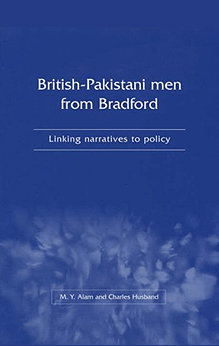
Author: M.Y. Alam and Charles Husband
Publisher: Joseph Rowntree Foundation
Release Date: 13 Nov 2006
Format: Paperback
Pages: 72
Source: https://www.jrf.org.uk/report/reflections-young-british-pakistani-men-bradford
Bradford’s largely Pakistani Muslim community has long-been the focus of national attention, beginning with the Honeyford affair of the mid-1980s and the notorious Satanic Verses book burning demo of 1989, extending to the Manningham riots of 1995 and the BNP-sparked disturbances of June 2001 – the last mentioned culminating in draconian jail sentences for the youths involved.
In the 2001 Census, 19 per cent of Bradford’s population described themselves as ‘Asian or British Asian’, with a number of wards with a substantial proportion of black and minority ethnic residents: 79%, Manningham; 75%, Toller; 70%, Bradford Moor, 63% City; 53% Little Horton and 42% in Keighley Central. There are currently over 80,000 Muslims in the Bradford metropolitan district, mainly in the inner city.
The authors of this competent report note that “economic and social indicators reveal that the Bradford ‘Pakistani’ communities do suffer from significant levels of deprivation and disadvantage. A good part of this disadvantage can be attributed to their location in inner city areas with relatively poor housing stock, educational underachievement, higher than average levels of unemployment and poor health. Measured against the index of Multiple Deprivation. . . in 2001, Bradford as a whole ranked thirtieth most deprived out of 354 local authority areas in England. And, taking much smaller areas of assessment – the Super Output Areas (SOAs) with a population of around 1,500, in 2004, 14 of Bradford’s 307 SOAs, primarily around inner Bradford, were within the most deprived 1 per cent of areas in England…the city has an economic profile that reflects the catastrophic decline from a nineteenth-century affluent textile monoculture to a city seeking to regenerate its economic base in a highly competitive regional and national context”.
The taxi and minicab business – hardly satisfying in terms of skills development and job satisfaction – has become one visible niche occupied by this displaced Pakistani labour.
The authors of this study consider it inadequate to discuss the dynamics of the community “solely in terms of ‘some abstracted struggle of around ‘a politics of identity’…behind the ethnic infrastructure…lies an all too concrete reality of economic determinism”. This point of view is reinforced more explicitly in another report from the same JRF stable – Lucinda Platt’s ‘Poverty and ethnicity in the UK’ (2007): “the concept of community cohesion. . . has emphasised the centrality of social relations at the expense of a focus on equality and economic integration”.
This is an important policy debate, because those ideologically committed to assimilationist policies – and hence opposed to diversity, multiculturalism and the ‘celebration of difference – see economic integration as a means to an end, while the JRF stable see the concern with tackling economic inequalities and seeking social justice as a worthy end in itself. As Platt notes, “inequalities and highly different risks of poverty are a concern for society in and of themselves. . .indeed the reduction of poverty may aid expression of difference: insofar as poverty limits opportunity, it also limits the ability to realise difference and felt identity”. So it is a red-herring to blame multiculturalism for polarisation, and rather the emphasis should be on addressing the needs of the most vulnerable.
In their interviews of 25 British-born Pakistanis aged between 16 and 38, Alam and Husband debunk the stereotype of a Bradfordian Muslim community that is self-segregating and isolationist. Interview after interview hightlight the sense of being “stakeholders, not only as members of particular communities, but also as operational and active members of civic society”. These are people with immense reservoirs of talent and energy, but find themselves in dead-end situations: “Cabbing’s something easy, something you can do. It’s too easy for me not do it. I want to do something else but then I think, ‘there’s nothing that I can do’.”
The study contains an amazing collection of searing and brutally true interview extracts that capture the view from the Bradford street. One further example: “There was this Muslim group – Muslim Council or something like that. I remember this, I saw it on telly and I remember having a right argument about it with one of my brothers. It was a little while after 9/11, and this group, they went and gave a sort of apology. I was sick, me. Why apologise? Why lower yourself? Why not apologise for everything else that’s bad and been done by a Muslim? It’s like telling the world: ‘Us Muslims, we’re alright. We won’t bomb you or terrorise you or kill you. And, even though we got ****-all to do with 9/11, we’re still sorry.’ How stupid was that? My brother, though, he thought it was good because it was trying to show the world that we’re not all like that, we’re not all extreme. But we’re not all extreme in the first place, that’s what got me. Why should anyone take the blame for what someone else has done? That’s wrong. It’s double standards. I’ll apologise when all Christians start apologising for all the black people they were lynched in America during slavery, or when they apologise for all the people that are still being killed today in Iraq and everywhere else”.
In Alam and Husband’s assessment , “the challenge to social cohesion lies, not in teaching Bradfordian, Pakistani/Muslim males the principles of British citizenship, but rather in opening up their routes to equitable and recognised participation in British life”.
Charles Husband is Professor of Social Analysis at the University of Bradford, while co-author Yunis Alam is a researcher at the University of Bradford, interested in mass media, communications and popular culture. He is also a member of the Light Transports writers’ collective.
M. A Sherif, 2007
